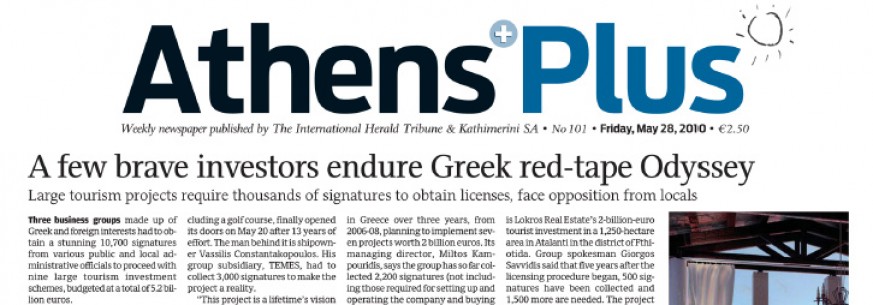Three business groups made up of Greek and foreign interests had to obtain a stunning 10,700 signatures from various public and local administrative officials to proceed with nine large tourism investment schemes, budgeted at a total of 5.2 billion euros.
The figure will come as no surprise to the majority of businesspeople who have packed up and left the country despite investing considerable sums, tired of the red tape, corruption, lack of zone planning, multiplicity of laws and frequent opposition by local interests. Their experience has probably deterred many others.
One who was not put off and will now see his investment come to fruition is the man behind Costa Navarino, Greece’s biggest ever tourism investment, on the south-eastern coast of the Peloponnese. The premium holiday resort complex, including a golf course, finally opened its doors on May 20 after 13 years of effort. The man behind it is shipowner Vassilis Constantakopoulos. His group subsidiary, TEMES, had to collect 3,000 signatures to make the project a reality.
“This project is a lifetime’s vision that began first from the heart and then became business plan. It was my father’s vision to make Messinia, his birthplace, one of the best-quality tourist destinations in the Mediterranean”, said Achilleas Constantakopoulos, TEMES managing director.
The Dolphin Capital Investors group bought 1,650 hectares of land in Greece over three years, from 2006-08, planning to implement seven projects worth 2 billion euros. Its managing director, Miltos Kambourides, says the group has so far collected 2,200 signatures (not including those required for setting up and operating the company and buying the land), while 3,500 more are needed to implement the licensing of the projects. This is an average of 800 per project, estimated about 20 times more than in other countries.
“In Panama, where we bought an island the size of Spetses with a particularly vulnerable natural environment, within a year and with 20 signatures we had obtained licenses for six hotels, 1,100 housing units, a marina and an airport, while also setting aside 1,000 hectares for a protected park which will be open to the public”, Kambourides said.
Another project that seems to have become entangled in red tape is Lokros Real Estate’s 2-billion-euro tourist investment in a 1,250-hectare area in Atalanti in the district of Fthiotida. Group spokesman Giorgos Savvidis said that five years after the licensing procedure began, 500 signatures have been collected and 1,500 more are needed. The project is estimated to create – directly and indirectly – some 7,800 jobs.
The Wall Street Journal wrote recently that “Greece’s bloated public sector secures its survival through an opaque mosaic of levies, taxes and red tape.” Speaking at the 18th Arab Economic Forum in Beirut last week, Prime Minister George Papandreou promised that his government is in the process of making the Greek economy investor-friendly.
“We are instituting new legislation so that new businesses can be licensed and founded immediately, in contrast to the past when such procedures took months”, he said.

